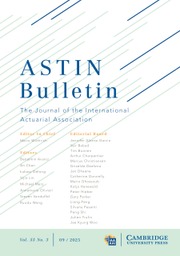Article contents
Optimal Loss Financing Under Bonus-Malus Contracts
Published online by Cambridge University Press: 29 August 2014
Abstract
The paper analyses the question: Should an insurance customer carry an occurred loss himself, or should he make a claim to the insurance company? This question is important within bonus-malus contracts with individual experience adjustments of the premium. The analysis model includes a bonus hunger strategy where the customers prefer the most profitable financial alternative, that is, the alternative which represents the lowest rate of interest. Hence the loss of bonus after a claim is calculated as a rate of interest paid from the customer to the insurer. Within this model the paper outlines the existence of a true compensation function and a relative cost function for each customer. A set of properties for bonus-malus contracts are presented and discussed. A concrete example of a bonus-malus system and an insurance compensation function illustrates the theoretical framework in a practical manner.
Keywords
Information
- Type
- Workshop
- Information
- Copyright
- Copyright © International Actuarial Association 2001
References
- 3
- Cited by

